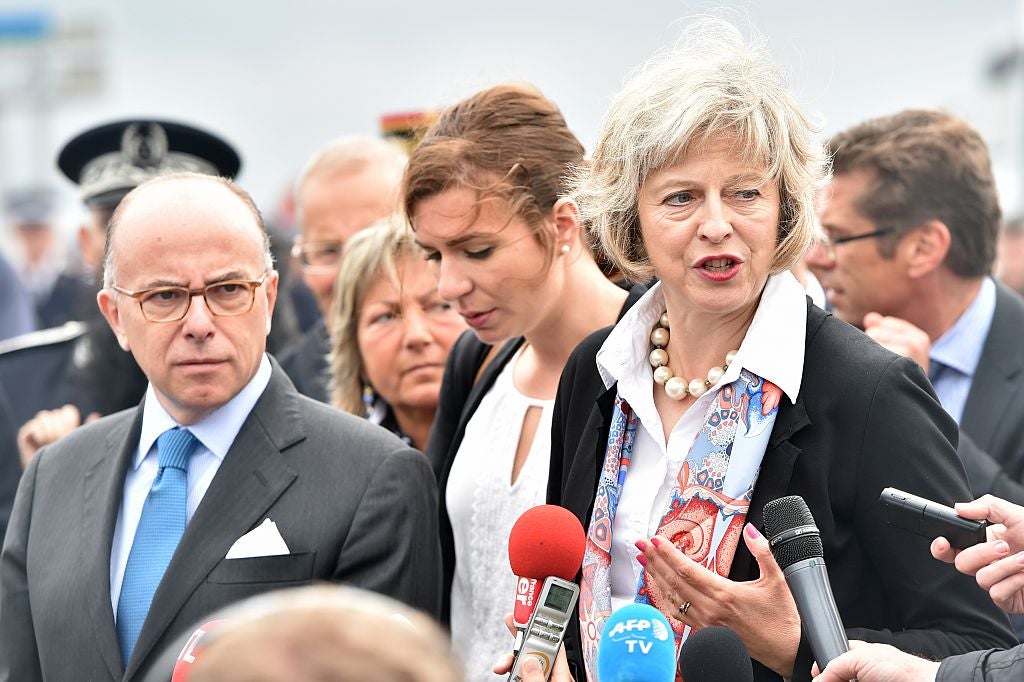The Independent's journalism is supported by our readers. When you purchase through links on our site, we may earn commission.
Theresa May’s vision for Brexit will ignite a war between British capitalism and British Conservatism
Margaret Thatcher was an economic liberal while Old Etonian Tory prime ministers such as Harold Macmillan and David Cameron were cultural and social liberals. In the name of southern English Tory nationalism, May is burying Tory liberalism and internationalism


If Europe’s two most powerful women were bulls we would say they have now locked horns. But new metaphors are needed to describe the true match of the century. Theresa May is starting a battle with herself, as she insists to her party faithful that the UK must fully leave Europe but, not to worry, trade and single market access will go on as usual.
Yet in Berlin last night, Angela Merkel, flanked by French president François Hollande and European Commission president, Jean-Claude Juncker, told the European Round Table of Industrialists that Britain could expect no concessions on the fundamental freedoms of Europe. If lorries, investment funds and consultancies can cross European frontiers without let or hindrance then so can European citizens.
For Germany, this has been a fundamental principle since 1950 when continental Europe’s steel and coal industries were placed under a supranational commission, with a parliamentary assembly and a court to decide on quarrels between the six participating states and their steel and coal firms. Written into that treaty, the forerunner of the European Union, was a clause forbidding hiring based on discriminating between citizens of different nations. It is called “free movement” but it is really the same as other anti-discrimination clauses which forbid national protectionism in awarding contracts or hiring labour.
Britain has one land frontier with an EU member state: Ireland. It is as open as going from England to Scotland – though not for long after Brexit. Germany, however, has land frontiers with nine other EU states; 380,000 French citizens along cross the frontier every day to work in Germany. Germany will not return to a world of long border waits and extensive customs inspections of lorries and car boots. (These now are inevitable at Dover and Folkestone; once Britain leaves the EU Customs Union, it will have the same relationship to the EU as Mexico or Russia.)
When May went to the G20 last month it was the first time she had set foot in China. Few other political leaders get to lead their nation in their sixth decade without having visited that great economic powerhouse. But, other than her fortnight of walking in the Swiss Alps, May has no record of deep interest in or knowledge of other countries, their politics and cultures. She is a pure product of the southern English Conservative Party and has devoted her life, since her schooldays, to grassroots political Toryism.

It was Socrates who said “I am neither Athenian nor Greek but a citizen of the world”. When May told her cheering party faithful that to be “a citizen of the world was to be a citizen of nowhere”, she was returning, not so much to the 1950s, but to the 1930s language of “rootless cosmopolitans” and to the hate of the pre-war nationalist right and Catholic Church for liberal values.
The bizarre proposal to publish lists of foreign employees – starting with the Bank of England and Premier League clubs? – is also a throwback to Thirties ideas of national preference. Margaret Thatcher was an economic liberal while Old Etonian Tory Prime Ministers like Harold Macmillan and David Cameron were cultural and social liberals, in a word cosmopolitan. In the name of southern English Tory nationalism, May is burying Tory liberalism and internationalism.
Her main statement that the European Court of Justice (ECJ) would have no more say in UK trade issues is impossible to combine with membership of, or even half-way access to, the world’s biggest market on the UK’s doorstep across the Channel. The ECJ is essentially a commercial court; it does not send people to prison. How will the world’s investors regard a Britain that appears determined to minimise its access to 450 million middle-class consumers? Merkel has given Brussels its marching orders. For Berlin, May’s singular interpretation of the June anti-immigrant plebiscite is not going to destroy Europe.
So now we will see a confrontation between British capitalism, heavily dependent on foreign investment, and British Conservatism. It is the most important political-economic debate and decision since the great struggle over free trade in the middle of the 19th Century.
Denis MacShane is a former minister of state for Europe and author of ‘Brexit: How Britain left Europe’
Join our commenting forum
Join thought-provoking conversations, follow other Independent readers and see their replies
Comments
Bookmark popover
Removed from bookmarks